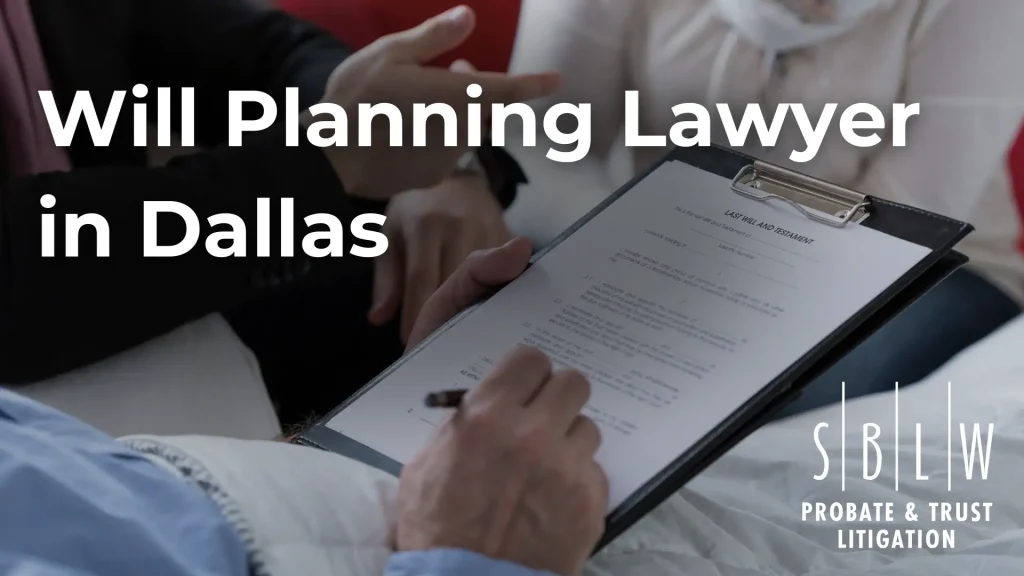
In so many of life’s everyday interactions, communication is key. Expressing our wants, desires, and concerns is what helps move us from point A to point B. What we tend to forget is that communication related to our passing is just as important. Even though we may be gone, there is a way to continue to communicate our wants and needs after our death – it is called a will. A will is a key piece of communication that directs our final wishes and provides for the loved ones that we leave behind.
At Staubus, Blankenship, Legere and Walker PLLC, our Dallas will planning lawyers understand that each client has individual needs and goals. We work with you to customize your will and tailor it to meet your and your family’s needs. We know it is difficult to face a future without yourself in it, but our compassionate team of attorneys is prepared to help you ensure that your family will be taken care of, and your assets won’t be frozen in limbo. Ready to talk about your estate plan? Contact our office at (214) 833-0100.
What Is a Will?
A will is simply a legal document that lays out your final wishes in regard to the distribution of your property, assets, and the care of minor children when you pass away. Unfortunately, many people mistakenly believe that a will is only for the very wealthy or those with complicated assets to divide.
A will is a legal document that can be as simple or as complicated as you make it. Everyone should have a will in order to clearly lay out their final wishes. Not only does it reduce confusion over who gets what, but it can also help your surviving family member gain access to your assets in a timely manner.
It is especially important to have a will if you have children. The failure to prepare a will may leave your children in a state of limbo, and it means that decisions about your estate will be left to the hands of judges or state officials, instead of the ones you love. Having a will means that you can rest assured that your affairs will be in order, and you’ve done everything possible to make your wishes known.
What a Will Can Do
A will provides direction for the distribution of certain property and assets at the time of your death. Again, wills can be as simple or as complex as you make them. A will can achieve a wide range of family planning goals, distribution outlines, and even some tax objectives. In addition to managing the distribution of your property and assets, a will can also do the following:
- Guardianship for Children: In a will, you are able to designate a guardian of your choosing to care for your surviving minor children. This helps to reduce the involvement of judges or state officials when it comes to determining where a child should be placed.
- You Can Choose Your Beneficiaries: A will can allow you to choose who receives your assets. For example, if you were to die without a will, state laws would typically not include friends, stepchildren, or godchildren as beneficiaries of your estate. By using a will, you are allowed to dictate who benefits from your passing, be it stepchildren, friends, or your favorite charities.
- You Can Designate an Executor: This person can be a personal representative of your estate.
- It Can Back-up a Living Trust: A will can be an excellent way to back up any type of living trust that you may have already established.
What a Will Can’t Provide For
 While a will can dictate the majority of your wishes regarding property and asset distribution, it cannot dictate everything. In general, it is important to note that wills are typically not found or read until well after your death. That means a will is not the ideal place to layout instructions for your final arrangements and funeral instructions. Those instructions are better spelled out in a separate document and left with an executor or trusted family member.
While a will can dictate the majority of your wishes regarding property and asset distribution, it cannot dictate everything. In general, it is important to note that wills are typically not found or read until well after your death. That means a will is not the ideal place to layout instructions for your final arrangements and funeral instructions. Those instructions are better spelled out in a separate document and left with an executor or trusted family member.
There are also certain conditions that a will just can’t reasonably accommodate. Adding certain complicated provisions to a will can result in legal challenges that tie up the distribution of assets in court for months, sometimes even years. Here are instances where a will may not be able to accomplish certain goals:
- Jointly Held Property: A will cannot transfer property that you hold jointly with someone else. This is also true for other assets that you own with rights of survivorship that pass automatically to the surviving owner.
- Life Insurance Money: A will cannot dictate who gets your life insurance money. That money will pass to the beneficiary named in the policy.
- IRA, 401(k), or Other Pension or Retirement Plan: The same holds true for IRAs and similar plans. A will cannot specify who this money passes to. It can only be distributed to the named beneficiary on the plan.
- Property in a Living Trust: A will can be a wonderful back-up to a living trust, but you cannot establish a trust and then dole it out to someone else by stipulating the change in your will.
- Putting Conditions on Gifts: Many times, people want to see their assets go to family members contingent on some expected behavior. For example, you may want to leave money to your son, but only so that he can pay for college. Making gifts conditional to behavior can be difficult to enforce and may open the document up to challenges. If you want to leave a gift contingent on a certain action, it may be better to discuss setting up a trust in addition to your will.
- Leave Money or Assets to Cherished Pets: We’ve all heard the stories of eccentric millionaires who leave their vast fortune to their beloved pet Fluffy. Unfortunately, pets aren’t allowed to own property. So, in essence, you are really just leaving your final wishes open to legal challenges from disgruntled family members. You can leave your pet to a trusted friend or family member and provide them with money or assets to provide for that pet. You can also consider donating to your favorite pet-related charity.
Frequently Asked Questions
We’ve provided answers to some of the questions we frequently receive about wills and estate planning. Don’t hesitate to set up a consultation with our attorneys to discuss your specific questions and needs.
What is the difference between a will and a trust?
Wills and trusts are two different types of estate plans, both with their own sets of benefits and drawbacks. Generally, a will is intended to include all of your instructions, but it must go through probate following your death, which will incur additional fees and take time to process – weeks, months, or even years in some cases. A living trust may be more expensive to create initially, but you can avoid probate. There are also tax implications for whichever route you choose. Consulting an experienced estate attorney and laying out your ultimate goals and needs is the best way to determine which option is right for you.
When do I need to create a will?
That depends on where you are in life and the status of your personal finances. A will is not a document that should be crafted immediately before passing. It is a document that should be carefully crafted with proper understanding and perspective. Many people begin to consider drafting a will in the following situations: when they get married, have a baby, or accumulate a number of assets or property.
Can I change a will?
Yes. It is possible to make changes to a will when life events make it necessary, or if there has been a significant change in your personal situation. It is important to remember that the only version of your will that will matter after your passing is the most current and legally valid copy in existence at the time of your death.
Are there things I can’t include in a will?
There are certain assets that a will cannot govern – non-probate property, for example. There are some forms of real estate and other assets that will pass to the surviving owner and cannot be distributed through a will. Also, an IRA or insurance policy will be passed to the named beneficiary, regardless of what you stipulate in a will.
Do I really need to hire an attorney to create a will?
You do not technically need an attorney to create a will. Should you hire an attorney to layout your will? Absolutely, yes. To begin with, in order for a will to be legally enforceable, it must be created and executed in accordance with state laws. Trying to do it on your own can be confusing and difficult, and you risk challenges to the document after you pass away. Keep in mind that the more assets, property, or valuables you have, the more complicated it can be to create an estate plan. You want to ensure that everything is legal, and everyone is accounted for when creating a will. An experienced estate attorney is the best resource you have for making that happen.
Why Choose Staubus, Blankenship, Legere and Walker PLLC to Set Up My Will?
The attorneys at Staubus, Blankenship, Legere and Walker PLLC are dedicated solely to helping clients navigate their way through estate planning and probate. When it comes time to sit down and think about drafting a will, we can discuss your wants, needs, and goals, and we can craft a plan that integrates all aspects of your assets, property, tax concerns, business planning, and family welfare.
Trust the legal team with over 100 years of combined experience to look out for you and your family’s financial future. If you need help drafting a will, contact Staubus, Blankenship, Legere and Walker PLLC today at (214) 833-0100. Use Google Maps to find our office and explore testimonials from past clients. Let’s set up a consultation to talk about your needs and how we can help.




